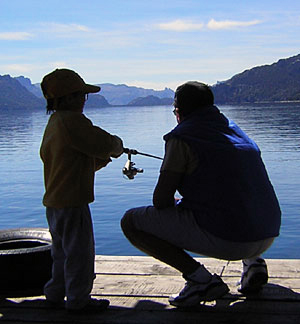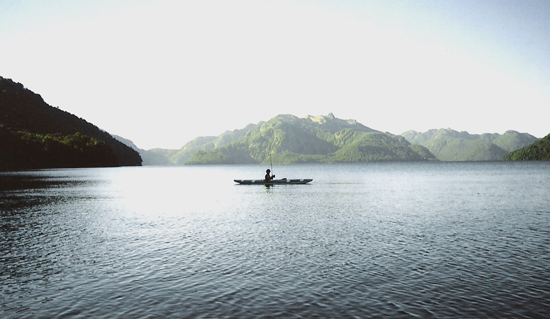There are passions that only fishermen understand See map
There is a widespread habit among fishermen according to which each new apprentice receives something from someone else more experienced that he had used when fishing, becoming a sort of godfather. All in a greater or lesser extent are "godchildren" of someone. All had a parent, grandparent or friend fan of fishing that entered hin in this activity.
 Parents and children enjoy fishing together.
Parents and children enjoy fishing together.This is demonstrated by the stories of Gaston Jorgensen, Pichón Fieg, Victor Brion and Marcelo, true "fishing enthusiasts". You can see that. For Gaston, he found fishing a few years ago thanks to a friend: "a crazy and very annoying friend from Córdoba took me and I loved, vey much". From that day Gaston uses the start and end of the season as key moments to enjoy fishing. The Pichón Fieg's case is very different. He started fishing when he was a "kid because of my grandfather who was very fond of this". At the age 50, Fieg got married and with two children he continue practicing what he learned from his grandfather.
To Victor Brion, a dentist of 52 years and Marcelo, a cop who prefers not to give his last name, are joined on one hand by the fact fishing for over twenty years and on the other hand by being fond of fly fishing.
There is something that they are quick to clarify. They repeat it and clear it again: they care for the environment, to the extent as the words of Gaston say:
"I will teach my children more than to fish, to care for nature. Because of this I learned many things about the care of our environment". Marcelo adds "contact with nature is priceless. Being in places where you can still breathe fresh air, where you can drink water from the river is magnificent". A little more serious he continues: "Environmental awareness created by the fly fishing has to want our children to have the same opportunity. We fight to conserve and preserve these places". And almost at the solemn speech, Fieg rescues a quote from a fishing expert and speeches for posterity: "The Patagonian trout fisheries are a world treasure. They are the heritage of each Argentine child, and the future of this heritage rests in your hands. You shall not fail".
That is their commitment and it is far from looking like a stand. And if it was, it would not be so serious because the fishermen agree that before fishing they first learn to exaggerate.
If there is anything that draws attention lately for those who are not familiar with the matter is that next to the word fish appears the adjective "sport". This implies, among other things, that it is a regulated activity, which is practiced only in season (November-April) and that almost in all of the sites is obligatory to return the piece to the water. According to Brion,
"we have a fishing regulation that we consider good. But it's not respected. Imagine what would happen if hundreds of people for week who go fishing take the pieces", and adds "the world's rivers that keep their fishing, it is fish and return and, they make enforce the season".
This is not arbitrary, it responds to the need to preserve the resource allowing fish to develop their reproductive cycle unaltered during the winter.
"Fishing for economic reasons is fostered around the world", explains Pichón Fieg and he adds "not thou the return. Fly fishing helped to spread this practice". In this line Marcelo says that "you take a commitment to take all possible precautions -barbless fly, gloves, waders- for the animal back to its environment at least hurt and stressed possible."
As a sport, fishing involves a competition or as they prefer a confrontation with nature, with the fish. Although the sad thing is if the fish wins, they exclaim. They are right. Especially considering how uneven the situation. For these things of advertising, the passion is associated with football, basketball and even cigarettes, but never with fishing.
Fishermen are by nature calm, relaxed, even almost harmless. This is the border between a football's fan and a flycatcher. Although the passion is the same. The one that best expresses or the one who is responsible is Marcelo:
"Fishing is a feeling. At the point of leaving everything to go fishing, including responsibilities, or doing 800 km to go fishing just six hours". He sounds convinced, he wants to convince "the fisherman stands anything to fish and go do what you he likes".
 Sunset on Lake Tromen enjoying nature, fishing and quiet. Photo courtesy of Ivan Carlin.
Sunset on Lake Tromen enjoying nature, fishing and quiet. Photo courtesy of Ivan Carlin.
At this stage fishing is no longer a sport fishing and becomes hedonistic. The question arises alone, and this time everyone agrees
"What gives me fishing? Essentially, disconnection of everything, the world, the problems, what are you doing at that time. The only rule is to fully enjoy," and they do. "Fishing gives me peace, tranquility, joy to see that you only get past that point," the speaker is Gaston, "but fishing is not only going to fish, but enjoying the moment, the barbecue with friends, hanging well." And that's another point that characterizes it: the camaraderie. Most fish in group. More or fewer people, but rarely go out alone.
The place where to fish: top secret
"Do not reveal never, under any circumstances, the place to fish" is another feature of these fishermen. It can be considered a triumph that they come to recommend a good fisherie, and if they do, it is because surely this is not their preferred location. It is clear that the friendship has its limits. Some, like Gaston, have cabals:
"I make the opening in Traful because there I got my first two trouts. Every year I start at the same place, it is like a cabal."
Others, like Marcelo, are obsessively correct: "My commitment goes beyond fishing. Leave the place where you are clean is very important. I try not to throw even a bit of tanza because it takes years to disintegrate. I consider myself among those who struggle for non-motorized rubber boats entering the water. For me the fish would not have to be weighed in a balance".
And they are all patients. According to Marcelo: "To be a fisherman you have to have something that is fundamental, which is patience. You have to know how to wait, and you have to like what you do too. Especially" he goes on to explain "when you have those days when anything does not itch".
It is very clear. It depends on the activity fishing is often a virtue or a defect. For them is a must. And so they take it.
A lovely setting
The Patagonian provinces offer excellent opportunities for fishing enthusiasts can perform this activity in a privileged landscape. In summer, rivers and lakes are the ideal natural setting for sports fishing in three ways: launching, drag and fly. Always bearing in mind that one of the attractions of the waters of this region is the excellence of the catch.
All recognize the same. Fieg says that:
"Catch a rainbow trout is a confrontation with an agile, strong and very athletic fish. With the addition of the place, which is nice for essence, with fast rivers and crystal clear water, all this combined makes fishing in Patagonia an unforgettable experience". In the same vein Gaston says, "The South is a great place to fish. And in my case, I prefer to fish in lakes than in rivers. For the simple reason that you have a directed fishery with the fish." Or as Marcelo tops "it is one of the few places in which after an hour of trying, you can get a copy over nearly eight kilos. It happened to me."
Anyone who would believe him but those who fish mistrust. They say that being a fisherman, also means being a little liar. In the fishing world circulates a joke that can be used to graph this: "Once a fisherman used to exaggerate, his other fishermen friends tied his hands so that when he count the size of fish he had caught he didn't lie . When his turn came, the man could not show the size of the specimen because, precisely, his hands were tied, he opened them as he could and said: You will not believe, but I caught a trout that has the biggest eyes!"
Viajes por la Patagonia
Related Articles
© Patagonia.com.ar 2025 | Todos los derechos reservados.
